But there’s another perspective of propriety. LDS singles can hold bitterness in their hearts towards someone they fault for their singleness. Never married singles can begrudge dating relationships that never worked out or simply never happened. Divorced singles can blame a former spouse. Widowed singles can embitter themselves towards whatever caused their spouse to die. Yet regardless of the cause, embittered singles can have beauty for ashes when they embrace the Savior and forgive. It begins with awareness Perhaps Sister Yee’s address spoke to me because I have my own need to forgive. My stake does absolutely nothing for singles. My leaders have responded to my pleadings by calling a stake rep who does absolutely nothing. They seem tolerant of a status quo in which sorely needed blessings are not received. Naturally, what results inside me is a roller coaster ride, and I’m not talking about my pancreatitis (although I could be)! I know I shouldn’t hold a grudge, and so I want to resist the conclusion that my leaders simply don’t care. At the same time, I struggle to see any evidence that they do care. I’m left resisting a bitterness launching itself at my door, eager to enter, and I’m tiring. In that context, Sister Yee’s recounting of the Old Testament story of Abigail seems apropos.
I like that phrase — “the weight of a warring heart.” It’s so poetic and yet so profound. It happens with belief If awareness is the first step towards forgiveness, the second must surely be belief. You must believe it’s possible for you to forgive before you’ll ever attempt it. If you truly believed it would never happen, you wouldn’t even try. This is where many who need to forgive stop. They somehow link forgiveness with the other person, the object of their bitterness and hurt, rationalizing that since said person will never comply with whatever their judgment demands, forgiveness simply isn’t possible. That link becomes especially strong when that other person offended egregiously. But forgiveness isn’t about the other person; it’s about you. It’s about stopping the canker of bitterness from blinding your vision and consuming your heart. It’s about healing the cancer that would steal your soul. Holding a grudge never punishes the other person; it punishes only you. That’s why I found Sister Yee’s personal testimony about forgiveness so moving. Her experiences encourage belief that forgiveness is possible, even when the hurt cuts very deep.
Her confession that she “still has work to do” makes relating to her experience much easier for me. And her hope for herself give me hope for myself. It continues with choice Yet the part of Sister Yee’s address I appreciate the most appears towards the end, where she reminds us of the importance of timing and adapting that timing to the individual. Not everyone heals at the same rate, and so we should be tolerant as others pursue their path of coming to Christ in their own way. That admonition to avoid judgments of timing is best applied within yourself. Extend kindness to yourself and allow your heart to take the time it needs to open to the Savior and experience the miracle of forgiveness. That kindness you extend to yourself by not insisting on a particular timetable promotes the healing you need. As Sister Yee testifies,
That last part is, I think, the key part of the journey of transformation the Savior promises. Unless you give to others what you have been denied, you’ll never be fully healed. Many LDS singles have been given ashes in their lives, but to receive beauty for your ashes, you must give beauty to others, for you always get what you give. So release the weight of your warring heart, believe forgiveness is possible, be kind with yourself, and give to others what you’ve been denied. When you do, you will find beauty from the ashes of your life. And that will bring you more joy in your journey.
0 Comments
You’d think that situation would turn me away from gratitude, but I had an experience the other day that turned me around. I realized that anyone can adapt to undesired change. You just need to find your new joy. Coming to terms  We’re all creatures of habit, and I certainly have habits when it comes to the holidays. As I just mentioned, many of those habits involve food. My condition won’t last forever. One day my recovery will end. I don’t expect I’ll go back to how I was before my first ER visit, and I’m not sure I’ll want to go back. But I am sure I’ll want to partake of my favorite foods occasionally — and indulge a bit when the annual holidays come around. That’s all cold comfort for me right now. Or at least it was. Sure, the thought of being around people gorging themselves on delicacies I can’t now enjoy doesn’t exactly fill me with delight. I already cancelled my birthday food plan. Now I’ll need to cancel my food plans for Thanksgiving and probably also Christmas and New Years. You’d think I wouldn’t have gratitude from this — and you’d be right before I had this wonderful experience the other day. Seeing new perspectives I was shopping for some new diet items and of course conscious of the items in others’ carts — items I wanted in mine but dared not on penalty of pain. So I tried distracting myself by focusing on accomplishing the task before me. I would get what I needed and go. That’s when the thought came to me. I’m not that bad off. First, I’ve been moving towards my present diet for some time in increments. I just didn’t want to surrender my favorite foods completely. My current condition won’t tolerate the increments; I have to be there now. That sudden shift gives new perspective on how much moving in small increments was really worth, and that’s something to be grateful for. Second, removing those foods from my diet left a lot of space, so I’ve been searching out recipes online that meet my restrictions. One by one, I’m finding them. Not only that, I’m finding new worlds of flavor as I avoid usual fillers like sugar and embrace spices and seasonings. I’m not sure I’d have all these wonderful new taste experiences without my health challenges driving me, and that’s something to be grateful for. Third, many of these recipes are so easy to make and way cheaper than the pre-packaged versions that I’m finding a new perspective on convenience. The short term convenience of time I get a can or a box doesn’t outweigh other conveniences like more flavor in my mouth, more health in my body, and more money in my bank account. All that’s something to be grateful for. Finding new joys When I put it all together, I have an experience I wouldn’t otherwise have. And that gives me a new perspective on not just my health but also living my life and finding more joy in it. Yes, I’ve had some undesired changes in my life, but I still have access to joy. It’s not the same joy I had previously; my circumstances won’t permit that. But new doors open for every old one that closes, and behind those new doors are new experiences, perspectives, and joys that all give reason for gratitude. So even though I won’t be partaking of the usual Thanksgiving Day feast tomorrow, I will be reflecting on how grateful I am for the new joys I’ve found and continue to find in my new life. So when your situation changes in a way you really don’t want, please take a moment to consider what you do have and find your new joy. You’ll gain new perspectives and new experiences you’ll wish you would have found earlier, and you’ll find yourself grateful you did find them. And that will bring you more joy in your journey.
I soon saw why. President Ballard’s references to the pioneers really resonated with me in the midst of my own difficult journey. In a way, I’m something of a pioneer. I’ve had my first visit to the emergency room, my first hospital stay, and my first surgery. The road I’m walking now is unexpectedly new to me. But that new road just heightens my need to take footsteps of faith. My pioneer mission Despite the newness of my current road, I’m not entirely in unfamiliar territory. I covered ground much like this on my mission. Being sick all the time with symptoms that came and went so much I couldn’t tell you what the next day would be like, let alone when exactly it would end. That sounds a lot like the road I’m on right now. President Ballard mentioned his own missionary service in his address, and it caused me to reflect on my own service, particularly how it prepared me for my life. It’s provided me a foundation for each new segment of my life journey. That’s why I really appreciated President Ballard’s initial words. Right out of the gate, he starts with bold testimony:
I need that hope now as I face my current challenges. It’s one thing to say it’ll all be over because I go home at the end of two years. It’s another when you don’t have such a marker in sight. Pioneers and prophets It’s not altogether surprising President Ballard centered his remarks around pioneers. He’s spoken in past Conferences about his pioneer ancestors and the lessons they offered him — and through him to all of us. Such references often get me thinking about my own pioneer ancestors. I don’t know much about them because the principle one never kept a journal. Perhaps my knowledge of my ancestors’ lives will change one day. In the meantime, I can lean on others like President Ballard to fill that gap. I was particularly impressed when he shared,
How many of us have really thought about that? It’s easy to get wrapped up in the difficulties of our own lives, so much so we can easily forget that the story of how we confronted our challenges could help those who come after us confront theirs. Knowing my response can help others gives me strength to make a better choice. President Ballard spoke of other pioneers. In particular, he mentioned President Nelson:
I so very much appreciated that quote from President Nelson, for if I ever needed a miracle, I need one now. What a tender mercy! Our pioneer Savior Of course, President Ballard saved the best example for last — our Lord and Savior, Jesus Christ. That’s altogether fitting since Christ is the ultimate anything good. Plus President Ballard’s remarks are entitled “Follow Jesus Christ with Footsteps of Faith.” It’s not just walking in faith. It’s walking the path of Christ in faith. Moreover, it’s not walking behind Him so much as it is beside Him. That concept I find especially comforting in my current difficulties. Don’t get me wrong. This road has been very rough, and I’m just getting started with it. But even in my most painful moments, the Lord has never abandoned me. He has stood beside me through it all. His walk beside me in my moments of difficulty invites me to walk beside Him in my moments of ease (which will come one day, for eventually this all will pass). President Ballard’s testimony of the Savior especially moved me.
Whatever road in life, may we each seek to follow Jesus Christ with footsteps of faith. He’ll strengthen us to become shining examples for those who follow us. He’ll encourage us through the voice of His Spirit and His living Prophet. And He will stand ready to lift us to higher ground as our trials bring our glean to a brilliant glorious sheen. And that will bring us more joy in our journey.
Assessing the moment  Pancreatitis is inflammation of the pancreas, which the pancreas can heal on its own. But to do so, it must be allowed to focus on that task. Calling it away for its usual duty of producing digestive enzymes or insulin will distract it and thereby prolong healing. That restriction has wrecked some havoc on my diet. Initially I was on a liquid diet and then slowly graduated to more solid food. So long as I stay within my restrictions and keep my meals small (this also helps the pancreas to focus on healing), I should be fine. That said, I still feel swings in my abdomen. Some moments feel better than others. I have even worse swings from my pulmonary embolism. The blood thinners I’m on have some funky side effects, one of which is lightheadedness. It comes and goes, some moments being better than others. Today was particularly bad. The lightheadedness was extreme as I’d never before felt in my life, and it stayed with me the whole morning. I spent much of the day today in the emergency room, where the doctor finally concluded I was experiencing a side effect of my meds. Confronting the moment How do I deal with a condition that not only constantly changes but changes so often I don’t really know how I’ll be the next day? The only real option I have is to do the best I can to attend to the demands of the moment. My condition forces it on me. But that’s not very different from what I’ve been sharing here on Joy in the Journey Radio. We find our best joy in life from living in the moment. Letting go of what things will mean tomorrow opens a door that otherwise remains closed. For example, LDS singles leave much joy on the table when dating by worrying about what different social interactions will mean for them tomorrow. “I don’t want to sit next to those people because then they’ll think I’m interested, and I’m not.” We think we know so much, yet in truth, we don’t know that much, and we see even less. There’s countless tales of couples who didn’t think they were right for each other but who are very happy today because they let go of what they thought they needed and embraced the opportunity in the moment. Embracing the moment Of course, letting go of what things will mean tomorrow isn’t license for leaving the covenant path. I’m in no way suggesting we ignore the consequences of sin. What I’m saying is that within the confines of our covenants we too often focus outside of the present moment, and that focus leaves a lot of joy on the table we could have every day by living in the present moment. By embracing the moments that come within the confines of our covenants, we position ourselves for maximum joy. Redefining what we consider opportunity to be reveals more pathways to experience that joy. The road can still be rough, as I can attest. Some of the moments that confront me are less than pleasant. But I know by doing my best with each moment, I know I’m making my journey as good as it can be. Embrace your life one day at a time. When you stop living in some future that never seems to come or the past that you cannot change, you find more possibilities in your life. You’ll gain more perspective that breeds more hope for the future. And that will bring you more joy in your journey.
Regardless of what’s going on there, I know the Lord will be with me to see me through. I know that because He’s always been with me throughout this entire ordeal. He’s never left my side. In fact, he gave me a wonderful experience. The Lord has bolstered my faith through an unexpected promise. A promise made  Going into the hospital, I had no insurance. I’ve been looking at options in recent years, but I always made too much money to qualify for Medicaid, and what remained was simply not affordable. Something had to change, because there’s no way I can pay all the bills I’m racking up. But with all the stress of it on me, I thought to put it off until after I get out of the hospital. Sunday I was reading in the D&C and came upon an interesting verse. The Prophet Joseph had traveled to Salem, Massachusetts, to pursue a claim of funds that could help alleviate the debts of the Church. Then I read this verse: “Concern not yourselves about your debts, for I will give you power to pay them” (D&C 111:5). I’d read that verse many times before, but this time it struck me with great force. I felt as though a way would be prepared for me, that I didn’t need to worry about it and could focus on getting through this experience in the hospital. I set my concerns about payment aside, but I had no idea what lay in store for me. A promise fulfilled The next day, I find text messages which my brother had sent me while I slept. His wife rarely speaks out with any sort of intervention in my life, but she had one that night and urged my brother to share it with me. She spoke from her previous experience working as an office manager for an assisted living home. And the advice was simple. "Let the hospital help you apply for Medicaid, and let them decide whether or not you qualify." I had looked at that earlier in the month and thought I didn’t qualify. But having nothing to lose by following that counsel, I pursued it. I started with the number for the case manager who had visited me earlier. Eventually, I connected with someone who submitted an application for me. And the application came back approved. The real miracle of this event is that coverage begins from the first day of the month from the application date. I applied on the last day of the month, so everything from the moment I first walked into the emergency room would be covered. A faith bolstered  I didn’t expect the Lord’s promise to be fulfilled so quickly. I thought everything would get resolved after I got out of the hospital. But in His love and mercy, He opened a way for His promise to be fulfilled. That may seem like a trite, little story, but the thought that came to me after I understood my expenses would be covered was neither trite nor little. Through the Spirit, the Lord reminded me of the promise He made me regarding my eternal companion and testified that promise was still real. Just as He fulfilled this unexpected promise regarding my medical expenses, He would open the way for His promise of an eternal companion to be fulfilled. D&C 111 isn’t one of those sections that one would expect to provide special, faith-promoting experiences. Yet an unexpected promise I received while reading that section has given me a much needed bolster to my faith, and I remain grateful to God for His love and mercy. So open yourself to unexpected promises. These tender mercies from the Lord can lead to the bolster of faith you may need in your life. As you share that experience with others, you can help them increase their faith. And that will bring you more joy in your journey.
Another two years later, I need those words. I find myself challenged even more with a hospital stay. It’s a new experience for me, as is needing any surgery, let alone two. All this has been unexpectedly thrust upon me. Yet even in these challenging circumstances, I can still choose my response. And so can you. No matter what life gives, when you choose to act, you can fight your fears with faith. Pray and act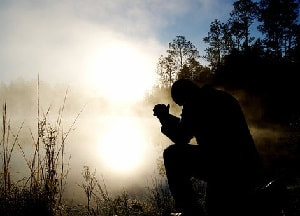 My most recent trouble began with abdominal pain, coming hard, fast, and sharp one afternoon. It seemed to wane as the night came, so I thought I might sleep it off. But the pain returned very soon after awakening. Having recently been diagnosed with an ulcer, I thought the pain might be excess stomach acid. I took a couple of antacid tablets and waited, but the pain continued on. And it was so massive, I couldn’t ignore it. But I didn’t know what to do. So I prayed for help. A voice I felt more than I heard whispered, “Go to the emergency room.” I looked at the time and wondered if I shouldn’t try to tough it out for three or four more hours, because then the clinic, which costs less than the emergency room, would be open. Again the voice whispered, “Go to the emergency room.” So I got dressed, put my shoes on, and went. There was certainly no sense of emergency in the people working there. Eventually I learned my previous diagnosis of an ulcer was not correct. My real problem is pancreatitis, a severe inflammation of the pancreas caused, in my case, by gallstones. But here’s where it gets tricky. Some of those gallstones have traveled into the bile duct connecting the liver with the pancreas. Those must be removed before the gallbladder. Due to differences in how surgeons enter the body for each of these tasks, two surgeries are necessary. Make your choice The universe isn’t without a sense of irony. I was thinking just the other day very little in my life is actually going my way. Everything seems a challenge, and I’m continually fighting from the edge of a cliff hoping not to fall over the edge into despair. Then I get this. As if that isn’t bad enough, the first surgery’s scheduled for Monday. Yeah, that’s right. I’m going to be under the knife on Halloween. I think I’ve had my fill of irony! Still, the choice we all have remains for me. Where will I place my focus? And what action will I choose? Sure, I have fears. In addition to ones stemming from current events, some of the same fears that plagued me four years ago continue to haunt me today. That’s because I haven’t taken sufficient action to build the faith needed to conquer those fears. And so it goes for us all. When we focus on what we lack, we encourage inaction, and faith being a principle of action cannot thrive, leaving fear to reign. But when we focus on what we can do and take action, always taking the next step we can take, we build the faith we need to fight fear. Don’t slow down It’s so easy to step back and surrender to fear. So often we all choose habits of maintaining the status quo rather than consciously maintaining our momentum towards our best life. But the easy choice rarely leads to great reward. Faith is built only through action. To have the faith the face your fears, you must act. Initially, any action will do, just to get some momentum. Once you start building enough momentum through any action, then you can shift your direction so you move towards your best life. When you choose to act, you can fight your fears with faith. The Lord hasn’t given up on you, so why should you? Take His strength, act in that strength, and no matter what comes your way, you can truly believe great things are in store for you. And that will bring you more joy in your journey.
Elder Christofferson approached belonging from a doctrinal perspective with practical application to belonging. That approach confirmed what we’ve been discussing here for years on Joy in the Journey Radio. But it also enlightened my understanding of what it means to belong. It’s easier to feel belonging when we truly understand the doctrine of belonging. See the commonalities  Elder Christofferson begins by listing the three parts of the doctrine of belonging: “the role of belonging in gathering the Lord's covenant people, the importance of service and sacrifice in belonging, and the centrality of Jesus Christ to belonging.” Let’s talk about how each of these parts relates to LDS singles. As the Lord gathers His covenant people across the world, we’d expect, as Elder Christofferson rightly notes, Church membership to become more diverse. We see that diversity today in every conceivable way, including life situation. This diversity offers great strength and richness but also great challenge as our biological hardwiring influences us to compare ourselves with others in order to assess how “normal” we are. Without context, such comparisons can demoralize and depress us. Elder Christofferson illustrated this effect in the story of Jody King, a married woman confronting infertility. As I listened to the heartrending emotions expressed in Sister King’s experience, I recognized a great parallel. You could change the details of her story from would-be-mother to would-be spouse, and the emotions would stay the same. We need to see less of the details differentiating us and more of our commonality as children of God. Elder Christofferson recognized that need when he taught,
We too should care about what others around us are becoming more than what they are today. Serve one another  In addition, we gain a sense of belonging within the Church as we serve and contribute to the larger Church community. This makes obvious sense and yet the realization of its truth escapes many of us precisely because it is so simple. We feel like we belong to a larger group when we do what those in the group do. Singles don’t do everything marrieds do (or at least they shouldn’t), and that distinction highlights the earlier distinction of identity (“I’m single and you’re married”) that destroys any feeling of belonging. But serving one another is something everyone can do. Being true to as many covenants as one’s made is something everyone can do. When everyone serves everyone else and turns their focus there, we see ourselves more doing what the group does and foster the sense of belonging we crave. Elder Christofferson recognized this truth as he shared,
How often have we singles focused excessively on our own unmet needs? Think back to such a moment in your life and consider whether you felt like you belonged to the larger Church community in that moment. However legitimate your unmet needs, focusing there always leads to feelings of isolation and abandonment, not belonging. Come unto Christ Of course, the highest and most important sense of belonging comes through Christ. We best promote that sense of belonging by nourishing a personal relationship with Him. We must spend time with Him daily. As I think back upon my many years of LDS singles life, I can remember many struggles with finding acceptance within my peer group. What helped me the most in those times was remembering He Who “came unto his own, and his own received him not” (John 1:11). Leveraging my struggle to feel closer to the Lord has helped me feel more belonging to Him, the only sense of belonging that really matters in the end. Elder Christofferson displayed that perspective as he declared,
LDS singles must live the doctrine of belonging in order to thrive and experience maximum joy despite their circumstances. As we identify as members of the covenant, strive to keep those covenants while serving one another, and spend time daily nourishing our relationship with the Lord, we can gain a sense of belonging to Him and His Church. And that will bring us more joy in our journey.
There really was nothing wrong with me, but there was something wrong with my thinking. Despite seeming natural, these sorts of comparisons with others are never fair. And I wasn’t alone there; many LDS singles unwittingly compare themselves to others. But you should compare you with you and no one else. Understand how you’re built Comparing yourself to others is inherently unfair. We all have different backgrounds, different knowledge, different experiences, different ways of seeing the world. Comparing yourself with others is like comparing apples and oranges. They’re both fruits, but beyond that they have few similarities. Yet recognizing that no good comes from that comparison doesn’t stop anyone from doing it. Why does it seem so natural to compare ourselves with others? Why are we so prone to make these comparisons despite their inherent unfairness? The answer is biology. We’re all biologically hardwired with a basic desire to be loved and accepted. Since like begets like, that desire translates into a desire to be normal, to fit in, to belong. And so part of our biological hardwiring assesses what’s normal by comparing ourselves with those around us. Think of that system as a sort of thermostat. We set our “temperature” to match the “temperature” of those around us so we’ll be like them and therefore fit in. This is why fat people who hang out with fat people find it hard to lose weight and fat people who hang out with skinny people find it easier to lose weight. In both cases, biology prompts the individual to be more like those whom that individual spends substantial time. Leverage how you’re built The same biological hardwiring works in any situation, including the one in which LDS singles feel like Moroni as they watch their friends leave singles life one by one. They feel out of place because they’re not like those around them. Time’s progressing, but they don’t seem to be. How do you deal with such situations? If your biological hardwiring has you wanting to be like those around you, and you find yourself stuck and unable to be like those around you, are you doomed to a miserable existence? My response? Only if you want to be. You can’t change your biological hardwiring, but you can redirect its influence. First, recognize both your propensity to compare and the inherent unfairness in comparing yourself with others. Then accept comparisons only between you and you. Every time you find yourself comparing you with anyone else, stop, remind yourself how unfair that comparison is, and then compare you with you. Essentially, you compare the person you are today with the person you were previously. It may be the person you were last year, last month, last week, yesterday, or even earlier today. But if you can see a reasonable improvement between the previous and present you, you’re making progress. And that’s what really matters. Grow into something more Of course, simply making progress doesn’t necessarily satisfy the basic need to belong, especially if everyone one around you isn’t comparing them with them. But that just highlights the need to choose with caution those with whom you choose to spend your time. Maximize your time around others who’ll help you compare you with you, and minimize your time around others who won’t. In the end, it won’t matter whether you did this or that within whatever time frame as much as whether the you at the end is better than any previous you, because that will mean you made progress along the eternal path. And making progress along that path will mean your time spent in mortality was worthwhile. Stop comparing yourself with others. They don’t have the same combination of background, knowledge, experience, and perspective you have. For all we share in common, our individual experience in mortality really is individual. So compare you with you and no one else. You’ll turn your focus more on making the progress you need to make, and that focus will then determine a reality of progress. And that will bring you more joy in your journey.
It’s not uncommon to find singles who have extended such expectations to every part of their lives. They include how many kids they will have, where they will live, what kind of career they have, and more. The list of rules their life is supposed to follow is quite long if not endless. Well, I’ve got just one thing to say to that. Your rules are dumb. Make rules for you Setting rules for how life is supposed to proceed establishes expectations. And that’s a problem, especially where other people are involved. Everyone is so imperfect that you’re almost certain to be disappointed. I know that sounds cynical. I’m not trying to be. Successful people take the world as they find it, not as they wish it would be. That means seeing things as they really are and calling them out. Expecting people to act a certain way so your life can unfold according to your fantasy is just dumb. Instead of establishing rules for how others should act, make rules for how you should. Others will almost certainly disappoint you, but you can choose not to disappoint yourself. You can work towards your best life by becoming your best self, and you do that by exercising the discipline to conform to rules that your best self would follow. That process of struggle as you seek to change not just your behavior but your identity fuels the growth for the transformation into your best self. Leverage life’s little surprises Your rules for how your life should proceed are dumb for another reason. By staking out an expectation of what will or even should happen, you cut off all other possibilities from being acceptable. And that removes much of the beauty your life could have. Life is wonderful not because it conforms with some plan of perfection but because of possibility. Variety and spontaneity are the spices of life because they highlight possibilities. It’s the possibility of surprise that helps make it interesting. Of course, some of those surprises would be more interesting if they didn’t invade your life. For example, my place recently flooded for the third time in the last two months. A surprise to be sure, but I don’t wallow in playing the victim. I choose to leverage the event to fuel my drive to improve my situation. Those improvements require me to think creatively about possible solutions and to work hard to realize them. If I insisted that my place wasn’t supposed to flood because that’s not how my life is supposed to be, I’d cut off the creativity I need to find solutions. I’d spend far too much time focusing on the problem, which creates a reality filled with problems. I’d miss out on how beautiful my life could be by truly living it — taking it by the reins and making it the best it can be. Open yourself to possibility What would happen if you suspended your rules and opened yourself to possibility? Instead of insisting that your life proceed according to some pre-determined expectation, what if you had the humility to embrace an alternative? I recall in a previous ward receiving an invitation to dinner. The family had invited another family to join us. As we waited for the women to finish preparations, the children were playing outside, and we men were conversing. Speaking of his wife, one of the men said, “I never thought I’d be happy with a red head, but I am.” When single, he expected he needed to marry a blonde to be happy. What he found by releasing that expectation and embracing possibility was true happiness found not in what he had but in what he gave. And the life he described living was truly beautiful. Your rules are dumb. Let go of the expectations that life must unfold a certain way in order for it to work for you. Your life will work for you when you do the work your best life requires. And that will bring your more joy in your journey.
Check your thinking Elder Christofferson starts with Job, recounting how Job’s sufferings tried him so deeply he began to condemn God for “wronging” him. God then reminded Job of His omnipotence and omniscience. Job, realizing he couldn’t hold a candle to his Maker, humbly let God prevail. In the end, “the Lord blessed the latter end of Job more than his beginning” (Job 42:12). Often the suffering of LDS singles leads them down the road of Job. They can feel wronged when they do their best to keep the standards of righteousness and yet desired righteous blessings don’t materialize. Worse yet, those blessings don’t show any sign of ever materializing. But the problem here is in how we think. We need to correct the faulty assumption that keeping the standards means we’ll have our desired blessings and certainly not in our way and on our schedule. Elder Christofferson taught,
The idea that “I’m not happy so God must be doing something wrong” assumes God’s main job is to make our lives blissfully care free. But God’s work is “to bring to pass the immortality and eternal life of man” (Moses 1:39). As we discussed last week, growth is often uncomfortable. Sometimes that discomfort comes from living without desired righteous blessings. Correct your assumptions  How then do the blessings we want come? Many LDS singles simply shrug their shoulders as they give the most common response: “I don’t know.” But other responses abound. In recent years, as the proportion of singles in the Church has grown, leaders have increasingly suggested the receipt of righteous blessings is largely out of our hands. They say God has an individualized and personalized plan for each of His children, and righteous blessings are dispensed as God executes that plan. Elder Christofferson appears to be in that camp when he taught,
I agree blessings which don’t conform to God’s will won’t materialize. However, I don’t think that means the lack of a particular blessing means it’s God’s will that blessing isn’t there. D&C 130:21 teaches every blessing is predicted upon obedience to the law connected with that blessing. If you don’t keep the particular law, you don’t get the particular blessing. Thus, any lack of companionship and marriage lies not in failing to keep the standards good enough but rather in the assumption that keeping the standards should yield the blessing of companionship and marriage. Those desired righteous blessings are predicated on a different law. Partner with Him You may well ask, “What is that different law?” The blessings of companionship and marriage come as singles progress through the stages of the dating journey. When singles follow the fundamental principles of that journey, they make progress in that journey. When they don’t follow fundamentals, they don’t progress. Period. Following fundamentals means becoming more agreeable, and that means changing you. Partnering with the Lord is the best way to know what changes you need to make now to become more agreeable. Partnering with the Lord also provides guidance, courage, and strength in making those changes. So a failure to see desired blessings in our lives should motivate us to increase our relationship with God, not diminish it. Elder Christofferson taught,
God hasn’t abandoned us simply because desired blessings haven’t come how or when we want. But we abandon Him when we lose faith in Him and allow that loss of faith to tolerate a lack of devotion to our covenants and our place in His work. That work is not about making life easy and comfortable but about helping others progress along a path that stretches into eternity. When life doesn’t go as planned, we need to increase our relationship with God. Hard times are a call to deepen discipleship. By heeding that call, we’ll find the guidance we need to know the next step as well as the faith and courage to take it. And that will bring us more joy in our journey.
|
Author
Howdy! I'm Lance, host of Joy in the Journey Radio. I've been blogging about LDS singles life since 2012, and since 2018 I've been producing a weekly Internet radio show and podcast to help LDS singles have more joy in their journey and bring all Latter-day Saints together. Let's engage a conversation that will increase the faith of LDS singles and bring singles and marrieds together in a true unity of the faith.
Comment
Joy in the Journey Radio encourages the free discussion of ideas but reserves the right to remove and/or block comments which do not conform to LDS standards.
Donate
Joy in the Journey Radio offers many free resources to help LDS singles everywhere, but it certainly isn't free! Help Joy in the Journey Radio in its mission to improve the lives of LDS singles by donating today.
Posts by Month
December 2022
Categories
All
|
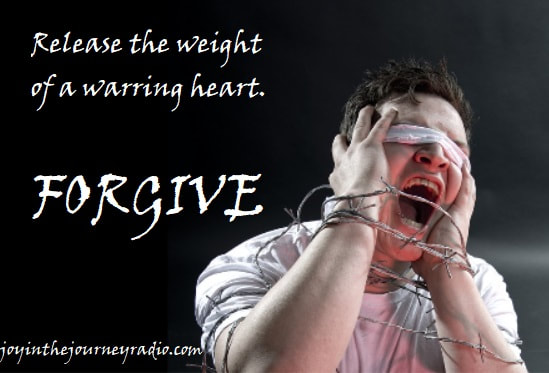




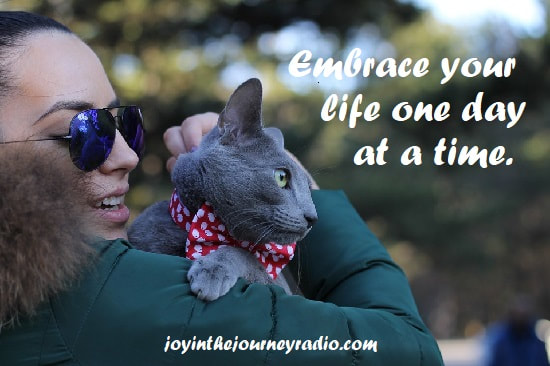

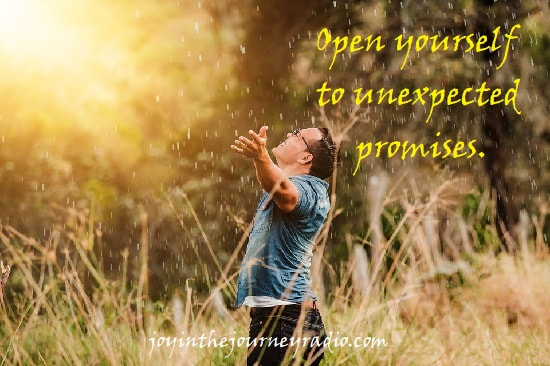




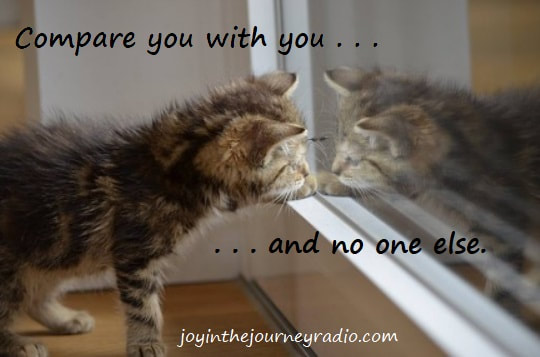


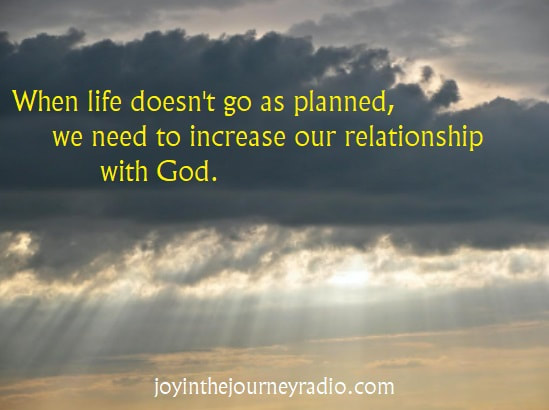
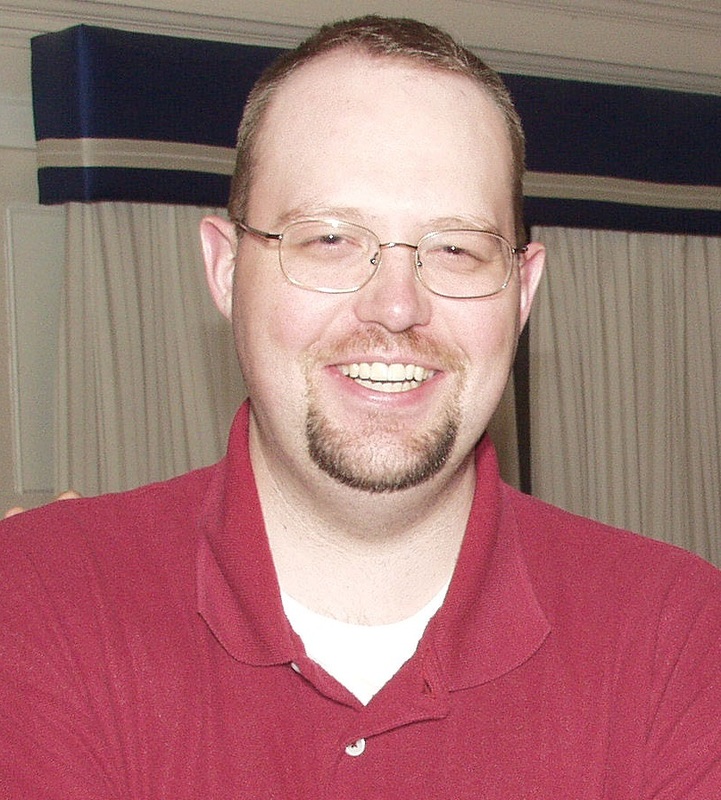
 RSS Feed
RSS Feed